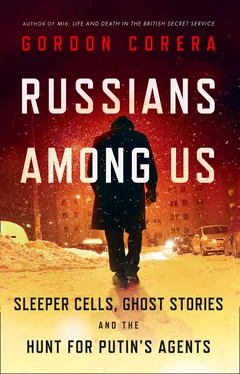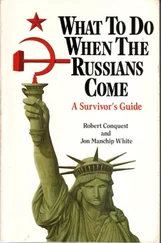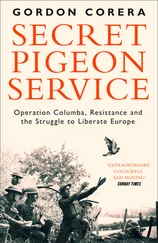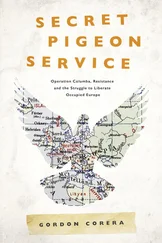PROLOGUE had been a “dangle”—sent by the KGB to mislead and misdirect. His job was to keep the CIA off the scent of what had gone wrong in 1985. The KGB normally did not dangle its own officers because they knew so much. The fear was they might use the opportunity to defect for real. The Americans knew this, which was one of the reasons they took a chance on the man on the train. But the KGB was willing to take risks to protect its top spies. And the dangle was no ordinary KGB officer. The name of the Russian who had put on such a bravura performance was Alexander “Sasha” Zhomov. Two decades later, he would be present in Vienna in 2010 and watch a spy exchange he helped negotiate.
Little has been said publicly about him but there are those inside the CIA’s “Russia House” and who work on Russia at the FBI who to this day call Zhomov their “Karla”—the Russian spy who was the archenemy of George Smiley in John le Carré’s Tinker Tailor novels. Other colleagues shy away from that reference. They dislike it precisely because they did not want to turn him into some elusive, mythic character. But that is what he would become. His name still elicits a pause and the drawing of breath from some veterans of the spy wars.
Zhomov was short, intellectually strong rather than physically so—one American who met him describes him as always well dressed, with smart Italian shoes. He had piercing gray eyes, thick eyebrows, and jet-black hair. Sometimes when they saw him over the years he would have an elegant mustache, other times not. He was no thug. “He is smart as shit,” says one American spy who came up against him. “He got inside our heads,” another says, recalling how Zhomov loved the games within games that make up espionage and the deceptions it entails. (American spies play their own games when it comes to Zhomov though, with a number trying to plant the notion he might be homosexual precisely because they know it will get him into trouble in Russia.) Those who met him often recall the silver crucifix he wore and how he would touch it occasionally, almost as if to ward off demons. In the late 1980s, he had already spent years studying the “main enemy” as a protégé of “the Professor,” Rem Krassilnikov, who ran the First Department of the KGB’s Second Chief Directorate. This was the department tasked with catching American spies. Zhomov supervised the surveillance teams that watched their every move. He was the man who would receive the daily reports of what the bugs in their houses had picked up or who had been out where or what they said on the phone. He knew their lives intimately. And in the PROLOGUE operation he got the chance to study his opponents face-to-face. This and other successes meant Zhomov would rise up in the KGB and then its domestic successor agency—the FSB—to eventually run the department hunting American spies and the Russians who spied for them.
One thing that marked out the Russians was their patience and persistence—not just in sending illegals abroad but also trying to catch foreign spies operating at home. CIA officers would come and go from Moscow Station; sometimes one would come back for a second posting after a decade away. But Zhomov was always there. He knew each individual, how they operated, and every trick and tactic they used. It meant he could immediately tell if there was some tiny change in behavior that suggested something was happening.
Zhomov’s deception operation in the dying days of the Cold War had been designed to put the Americans off the scent of the moles that the KGB had inside American intelligence. It was not lost on anybody that the KGB would not dangle one of its own officers for nothing. If PROLOGUE was a dangle, then it meant there was likely a mole he was trying to protect. The small team of American mole hunters slowly began to narrow down the possible list of traitors who had access to the compromised intelligence. The investigation waxed and waned as superiors lost interest, but the team continued its search. By 1993, the CIA team had narrowed down the list to one officer. But there was still skepticism in many quarters and the FBI would not go along with their assessment. And so it took a spy to help push the investigation over the line.
What can seem so arcane in the world of espionage between Russia and the West is that so much of what goes on is what is known as counterintelligence—the world of spy on spy. Counterintelligence is about understanding and battling your opposing intelligence service. It can seem inward looking. But it has consequences. If your enemy has a spy in your ranks, then everything you do can be compromised. Your agents’ lives are at risk and so are your secrets. Your opponent can feed in false information to deceive you. The trauma of having your intelligence service penetrated is intense. It means you have played the game and lost. It took MI6 decades to recover from the discovery that one of its most senior officers, Kim Philby, was working for the KGB (the inspiration for John le Carré’s Tinker Tailor Soldier Spy ). So how do you stop such a disaster? One way is to play defense and protect your secrets and watch your own people. But that is hard (and creates the kind of surveillance state the KGB operated at home). So the best defense is a good offense. If you recruit one of their spies you can find out who they have recruited on your side. If you feared your own intelligence service was penetrated, then the most effective way of finding the traitor is not through detective work but to recruit a spy in your opponent’s intelligence service who can tell you who is responsible. It takes a spy to catch a spy. This truth drives each side to try to penetrate the other. This is the inner core of the spy world—its inhabitants sometimes drawing suspicion from their colleagues since they are looking for traitors and deception everywhere around them. It takes a particular mind-set to be able to work in counterintelligence—but for some, too much time immersed in this world of the “wilderness of mirrors” could drive you mad as you lost the ability to distinguish between deceit and truth.
IN AMERICA’S MOLE hunt, the detective work to find their mole was supplemented by vital intelligence from a KGB officer. Alexander Zaporozhsky would be one of the four men swapped in Vienna in 2010 and was one of the most important agents of the era, even though little has emerged publicly about him. Zaporozhsky had joined the KGB in 1975 and served in Africa and in the Latin America department. He was tall and athletic. Former colleagues say he was an ambitious workaholic and a risk taker. In a posting to Ethiopia in the mid-1980s, he had become fluent in the local language of Amharic and was a skilled recruiter of agents, supposedly recruiting dozens of well-placed sources. But it was not the most prestigious posting and, unhappy over his career and money, he offered to spy for the CIA. He was code-named “Max.” The Americans found him well-spoken and self-assured. “If you were casting someone for the role of a KGB colonel, he would get the part,” says one person who knew him. But he had been hard to handle, sometimes feeding erratic information to his handlers and disappearing for long periods. Eventually he would become a colonel in the SVR’s North American department. In the years of turmoil and decline in the early 1990s his disillusion grew. These were difficult times with the country in crisis and spies were eager to cash in as discipline deteriorated. In 1993, Zaporozhsky, even though he did not know the traitor’s name, passed on a piece of information that helped identify the mole that the KGB and SVR had inside the US intelligence community. For this clue, Zaporozhsky would be well rewarded but also pay a price.
The clue confirmed that Russia House itself had a traitor. Aldrich Ames was a second-rate spy who was convinced he was first-rate. For all his failings, he had still been appointed to a sensitive role working on counterintelligence in the Soviet division. In 1985, he had used the pretext of trying to recruit a Soviet diplomat to instead offer the KGB his services. In his second meeting he provided a haul of information the KGB would describe as stunning, tilting the balance of the spy wars in Moscow’s direction. “He was as lazy, sloppy, and careless at spying as he was at his CIA job,” writes former colleague Mike Sulick. When investigators closed in, they found operational notes torn up in his trash. On February 21, 1994, the FBI arrested him. The revelation that the CIA had harbored a mole working on its crown-jewel operations was a hammer blow. “His treachery devastated the CIA,” Sulick later wrote. A generation of Russian agents had been sold out and now it looked like the agency could not be trusted to keep secrets. Ames’s treachery also played into a debate in Washington that asked what the CIA was really for now that the Cold War was over. Congress and the press went on the attack. Worse, a few on the inside soon realized Ames could not have been responsible for all of the compromises. That meant there was another traitor still out there—this was the man who had made the drop in the park as the Russian coup was beginning on the Monday morning in August 1991.
Читать дальше












